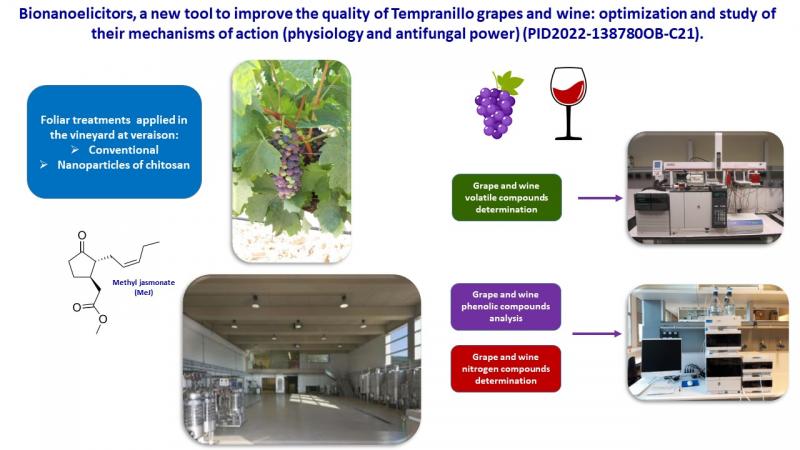Spain, with nearly one million hectares of vines, is one of the wine-producing countries most affected by climate change (high temperatures, droughts, etc.). This phenomenon causes physiological disorders in the vine that result in a reduction in grape quality (imbalances between technological and phenolic maturity), imbalances in defense mechanisms, etc. Together, they are detrimental to the production and quality of wines and to the sector's economy. In addition, the sector has to reorient itself due to increased consumer concern about contamination problems, consumption of clean label products and their impact on health. To address these challenges, innovative, efficient and easy-to-implement agricultural practices are needed. The use of elicitors could be one of them. Elicitors are compounds that when applied to plants trigger defense mechanisms, increasing the synthesis of secondary metabolites. In viticulture they can have a double benefit: reducing the use of pesticides and increasing the synthesis of nitrogenous, phenolic and aromatic compounds, which are important for quality.
CHIMENANO proposes to use nanoparticles carrying the the elicitor methyl jasmonate (MeJ), which allow a more controlled release of MeJ, reducing its dose to a tenth of that of a conventional foliar application. In this case, chitosan-based nanoparticles will be synthesized by doping them with MeJ (MeJ-ChNPs). Chitosan is the second most abundant biopolymer in nature and the first compound authorized by the EU for phytosanitary purposes. Therefore, the main objectives of the present project are: (i) to select the best MeJ-ChNPs treatment on seedlings to evaluate its antifungal effect; (ii) to optimize the application of this treatment in the vineyard to improve the composition and quality of Tempranillo grapes and wine, thus helping to mitigate the effects of climate change, compared to conventional treatment (MeJ) and nanoparticles alone (ChNPs); (iii) to study the mechanisms of action of the treatments on the plant; and (iv) to employ advanced chemometric tools to address the statistical study of all the results.
CHIMENANO (PID2022-138780OB-C21) is a project funded by Spanish National Research Agency together with European FEDER funds within the framework funded by the 2022 Call "Proyectos de Generación de Conocimiento" within the framework of the State Plan for Scientific and Technical Research and Innovation 2021-2023. The project is led by Dr. Teresa Garde Cerdán and Dr. Eva Pilar Pérez Álvarez, from the Viticulture and Applied Oenology Group (VIENAP) of the ICVV and will be developed in coordination with the Departments of Biotechnology and Viticulture and Oenology of the Murcian Institute of Agricultural and Environmental Research and Development (IMIDA), Murcia.









